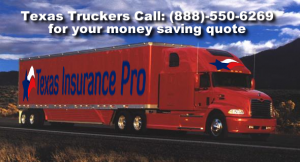If you’re a CD licensed Texas truck driver, you’ve probably wondered what it takes to become an owner operator. As an insurance agent that deals with a several small commercial carrier, I’ve seen a number of guys make truly avoidable mistakes. In order to do so, it takes a good team of people to help you get licensed, insured, loaded, and hauling those big money for hire loads. As a result, I’d like to help you by giving you steps and tips to becoming an Texas Truck Driver from an insurance agent’s perspective.
Texas Truck Insurance Tip 1: USDOT Number.
This can be done by going to the Federal Motor Carrier Safety Administration’s website. Although the FMCSA will allow you to fill the paperwork out and mail or fax it to them, it is always wisest to use the online registration systems whenever possible. It doesn’t cost anything to get your USDOT. However, you must first determine if you are operating as an intrastate carrier (inside one state only), or an interstate carrier (operating in more than one state). If you choose to operate in more than one state, you will have to pay fees for your motor carrier or MC registration number.
Texas Truck Insurance Tip 2: TX DMV Certificate Number
Once you’ve gotten your USDOT number, you need to get your TXDMV certificate number. This replaces the old TXDOT number requirement. Just like the federal, you can either register by phone, fax, or online. For immediate results, it’s always best to call the Texas Department of Motor Vehicles and get them to setup your account, and finish by paying the appropriate application fees online. In order to complete your online setup you will need the the following:
- · Commercial Auto Insurance and the proper form filings
- · USDOT number and company information
- · Drug Testing Consortium information (for new entrants)
- · Company, and Company contact information
Texas Truck Insurance Tip 3: Commercial Auto Insurance (Truck Insurance)
Regardless of whether you’re a for hire commercial carrier, or a household goods carrier, you will need to make sure that you’ve got your commercial auto insurance in place. Make sure to verify your coverage requirements. Depdenting upon the class of vehicle you will be required to file a form E stating that you carry the mandated amount of coverage for your business; coverage could range from 300,000 liabiliity to 5,000,000 liability. Aside from commercial auto liability, your business may be required to carry additional cargo coverage. For household movers in Texas, they are required to carry $10,000 cargo coverage and file forms H and I.
Now that you’ve gotten your USDOT, MC, and TXDMV Certificate registrations done. Now you have to find loads. Hopefully, you done your homework and know exactly what sites to visit in order to get your loads. There are a number of logistics companies available. The key is to sign up with a number of companies and begin building relationships with the individual brokers. For most Texas Truck drivers, that is an adventure of it’s own.
Texas Truck Insurance Tip 4: Networking with Dispatchers and Freight Brokers
From now on, keep a lookout for freight brokers and dispatchers. Aside from searching Broker Loadboards and Logistics load boards like Landstar, you’ll find that networking should be a vital part of your business. Face it, dead head miles on a tractor is bad for business. So, Just like any other business, talking to people about their experiences in the trucking business can make you thousands of dollars very quickly. If you do a good job, and show up to the yards and deliver your loads on time, you will build a good reputation and continue to get loads and avoid those dreaded dead head miles.

